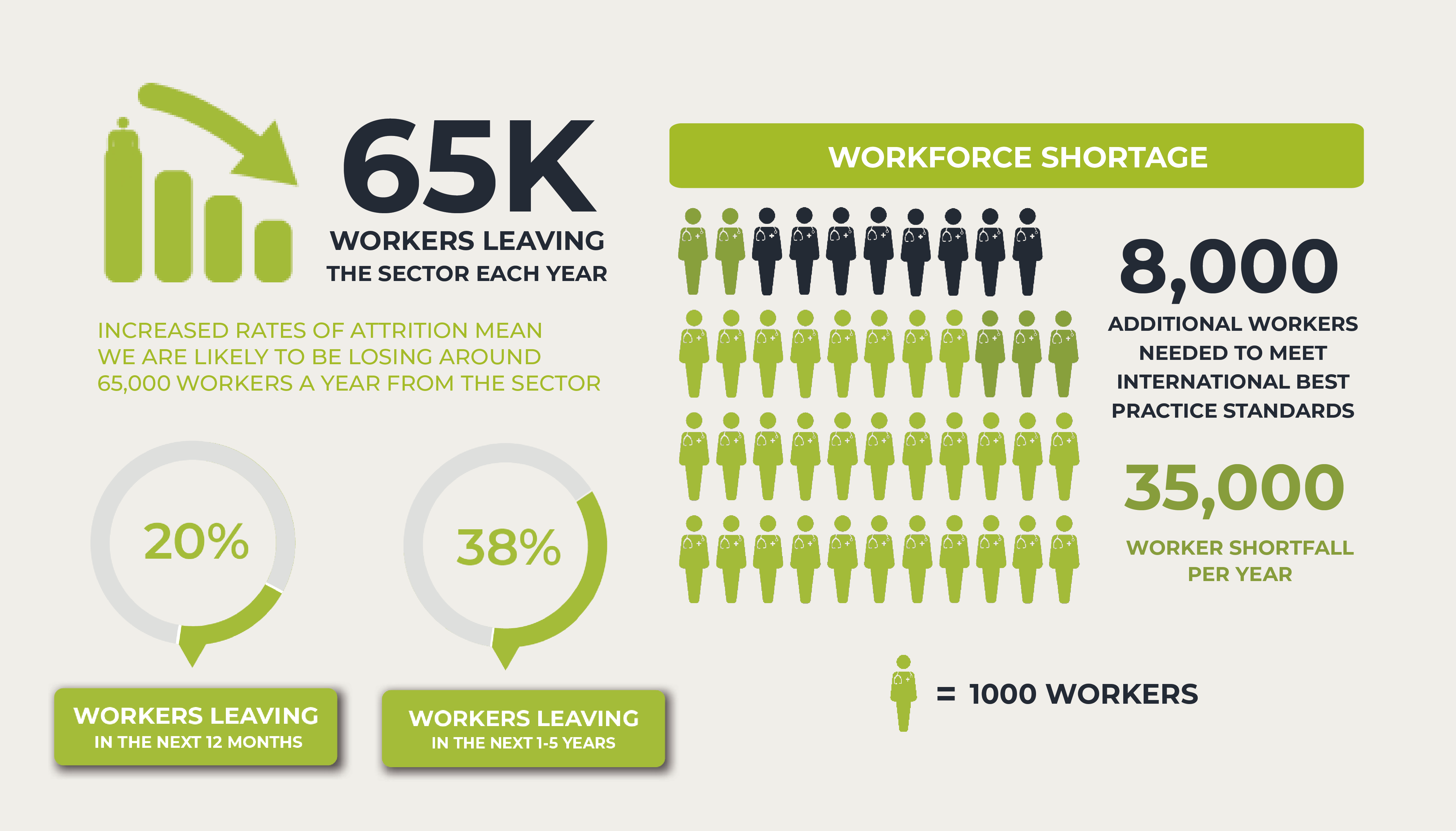Demand for Health Care Workers in Australia: Why Is It Increasing?
Like many industries, the healthcare industry in Australia is experiencing a significant transformation. One of the most pressing issues faced by this sector is the increasing demand for healthcare workers. As the country’s population grows and ages, the need for qualified healthcare workers is reaching unprecedented levels.

While 14% of the Australian workforce is working in the healthcare and assistance industry, the shortage of skilled healthcare professionals is rapidly increasing.
This growing demand for skilled healthcare professionals is putting the industry under pressure. The industry is estimated to experience a major skill shortage over the coming years due to an ageing workforce and current retention challenges.
The Care Workforce Labour Market Study by the Australian Government has projected a shortfall of over 200,000 healthcare workers in Australia by 2050.
Factors Driving the Demand For Healthcare Workers in Australia
The demand for healthcare workers in Australia is fueled by several key factors that significantly impact the healthcare landscape. These factors contribute to the increasing need for skilled professionals to provide quality care to the population. Let’s explore the main drivers behind the growing demand for healthcare workers in Australia:
Australia, like many developed countries, is experiencing a demographic shift characterised by an ageing population. According to the Australian Bureau of Statistics, 16.3% of Australia’s total population (over 4.2 million people) are aged 65 or older.
As people age, they are more likely to develop chronic conditions, age-related diseases, and require specialised care. The rise in healthcare needs among the elderly population places a greater strain on the healthcare system, necessitating a larger workforce to meet the growing demand. Statistics highlighting the ageing population and its impact on healthcare needs clearly indicate why the demand for healthcare workers is increasing in Australia.
Australia has been experiencing population growth, driven by factors such as natural increase and migration. The increasing population demands more healthcare services across all age groups, placing additional pressure on the healthcare workforce to meet the needs of a growing number of patients.
Medical advancements and technological innovations have significantly improved healthcare outcomes and increased the range of available treatments. However, these advancements also require a skilled workforce to implement and deliver these advanced healthcare services effectively. The demand for healthcare workers with specialised skills and knowledge in specific areas has increased due to these advancements.
Australia’s vast geographic landscape presents challenges in delivering healthcare services to rural and remote areas. These regions often face shortages of healthcare professionals, including doctors, nurses, and allied health workers. The unique healthcare needs of these communities, combined with the difficulty of attracting and retaining healthcare workers in remote locations, contribute to the increase in demand for healthcare professionals who are willing to work in rural and remote settings.
Shortage of Healthcare Workers in Australia
Australia is currently facing a significant shortage of healthcare workers, which poses challenges to the healthcare system and the delivery of quality care to patients. This shortage encompasses various healthcare professions, including nursing assistants, aged care workers, personal care assistants, resident care workers, and support staff.
Several factors contribute to this shortage, and its impacts are felt across the healthcare sector. Let’s delve into the reasons for the shortage and its consequences:
The increasing demand for healthcare workers in Australia necessitates proactive measures to address the shortage and ensure a sustainable healthcare workforce. Various stakeholders, including the government, educational institutions, and healthcare organisations, can play a crucial role in implementing strategies to meet the growing demand. Let’s explore some key measures that can be taken:
Opportunities for healthcare workers in Australia
The increasing demand for healthcare workers in Australia presents a range of opportunities for individuals pursuing careers in the healthcare sector. As the population grows, healthcare services expand, and medical advancements continue, the need for skilled professionals across various specialties becomes more pronounced. Let’s explore the opportunities available for healthcare workers in Australia:
- Growing career opportunities
The increasing demand for healthcare workers is creating abundant job prospects in various healthcare settings. Hospitals, aged care facilities, clinics, community health organisations, childcare centers, and rehabilitation centers are actively seeking skilled healthcare professionals for essential roles. From nurses to allied health professionals and support staff, the opportunities are diverse and plentiful. This allows healthcare professionals to choose from a wide range of specialties and work environments that align with their interests.
- Benefits and Incentives Offered to Healthcare Professionals
To attract and retain skilled professionals, healthcare organisations often provide attractive remuneration packages and benefits. These benefits may include competitive salaries, flexible work arrangements, professional development opportunities, and comprehensive healthcare coverage. Additionally, governments and healthcare institutions may offer incentives such as relocation assistance, loan repayment programs, and subsidised training to encourage healthcare professionals to work in areas experiencing workforce shortages.
- Collaborations and interdisciplinary opportunities
Healthcare professionals also have the opportunity to work in multidisciplinary teams, collaborating with experts from various fields to deliver comprehensive patient care. The healthcare industry emphasises teamwork to encourage collaboration between doctors, nurses, community healthcare workers, allied healthcare professionals, and other healthcare workers. This approach ensures that patients receive holistic and integrated care, promoting better health outcomes. By working collaboratively, healthcare professionals can learn from each other, share expertise, and contribute to a patient-centered approach.
Key Takeaway
The demand for healthcare workers in Australia is increasing at a rapid pace. This growing demand presents both challenges and opportunities for the healthcare sector. The skill shortage in the healthcare industry demands immediate actions to attract, train, and retain skilled professionals to meet the evolving healthcare needs of the growing population.
Improved promotion of advanced courses with the right skill set will help bridge the skill gap. Promoting health service management and health service assistant courses, along with courses and training specialising in certain skill sets, will ensure access to a skilled workforce for Australia’s healthcare industry.
Are you looking to enhance your career in the healthcare field? DP Training offers nationally recognised training courses designed to equip you with the skills and knowledge needed to excel as a healthcare professional.
Take the next step towards a rewarding and fulfilling career. Enrol now and unlock your potential as a healthcare professional!



Frequently Asked Questions
1. What are the career prospects for healthcare workers in Australia?
The career prospects for healthcare workers in Australia are promising. With an increasing demand for healthcare services, there is a growing demand for healthcare professionals like doctors, nurses, community health workers, patient support assistants, support workers, aged care support workers, residential care workers, and other healthcare support staff.
2. What are the consequences of the shortage of healthcare workers?
The shortage of healthcare workers can lead to longer wait times for appointments and treatments, increased workload and burnout amongst existing healthcare workers, and potential compromises in the quality of patient care.
3. Which healthcare field is most in demand in Australia?

While many healthcare jobs are in high demand in Australia, fields such as nursing, aged care, mental health, and home health aides are experiencing significantly high demand due to population ageing, increased awareness of mental health issues, and the need for comprehensive patient care.





